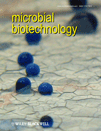
BIOTECHNOLOGY ADVANCES
Scope & Guideline
Transforming Knowledge into Biotechnological Advances
Introduction
Aims and Scopes
- Synthetic Biology and Genetic Engineering:
Research on the design and construction of new biological parts, devices, and systems, including advancements in CRISPR technology and genetic modifications of various organisms to enhance production capabilities. - Microbial Biotechnology:
Exploration of microbial systems for the production of high-value compounds, including enzymes, bioplastics, and biofuels, as well as the engineering of microorganisms to optimize metabolic pathways for industrial applications. - Biomanufacturing and Bioprocess Development:
Studies focusing on the optimization of bioprocesses for the production of recombinant proteins, enzymes, and other bioproducts, including techniques for scaling up production and improving yield. - Biotechnology in Agriculture:
Research on the application of biotechnological tools for crop improvement, pest resistance, and sustainable agricultural practices, including the use of genetically modified organisms (GMOs) and biopesticides. - Environmental Biotechnology:
Investigations into the use of biotechnological methods for environmental remediation, waste treatment, and sustainable resource management, emphasizing the role of microorganisms in bioremediation. - Bioinformatics and Computational Biology:
Application of computational tools and modeling techniques to analyze biological data, enhance metabolic engineering, and support synthetic biology initiatives. - Nanobiotechnology:
Development of nanomaterials and their application in biotechnology, including drug delivery systems, biosensors, and bioimaging.
Trending and Emerging
- Metabolic Engineering and Synthetic Biology:
There is a growing emphasis on integrating metabolic engineering with synthetic biology to create novel microbial chassis capable of producing complex biochemicals, reflecting the demand for sustainable production methods. - Machine Learning in Biotechnology:
The application of machine learning and artificial intelligence in biotechnological research is on the rise, facilitating data analysis, predictive modeling, and process optimization across various biotechnological applications. - CRISPR and Genome Editing Technologies:
Research on CRISPR and other genome editing technologies is expanding rapidly, with applications in agriculture, medicine, and industrial biotechnology, highlighting the versatility and potential of these tools. - Biomanufacturing of Bioactive Compounds:
There is a noticeable trend towards the biomanufacturing of bioactive compounds, including pharmaceuticals and nutraceuticals, from microbial and plant sources, driven by the demand for natural products. - Sustainable Bioprocessing and Circular Economy:
Emerging interest in sustainable bioprocessing techniques that align with circular economy principles, focusing on waste valorization and resource recovery from biological systems. - Environmental and Agricultural Biotechnology:
Increasing focus on biotechnological solutions for environmental challenges and agricultural sustainability, including bioremediation, biofertilizers, and biopesticides.
Declining or Waning
- Traditional Biocatalysis:
Research focused solely on traditional enzyme applications is decreasing as interest shifts toward more advanced methods such as enzyme engineering and biocatalysis integrated with synthetic biology. - Single-Organism Studies:
While studies on single microbial species were once prevalent, there is a noticeable decrease in interest as researchers increasingly focus on complex microbial communities and their interactions. - Basic Plant Biotechnology:
The application of basic biotechnological techniques in plants, such as simple genetic modifications, is less common as the focus has shifted to more complex genetic engineering and synthetic biology approaches. - Conventional Fermentation Processes:
Interest in conventional fermentation processes without significant innovation is declining, as newer, more efficient biotechnological methods emerge, emphasizing the need for process optimization.
Similar Journals

Applied Biological Chemistry
Advancing the Frontiers of Biological Science.Applied Biological Chemistry, published by SPRINGER SINGAPORE PTE LTD, is a premier open access journal that has been serving the biological sciences community since 2016. With an ISSN of 2468-0834 and E-ISSN of 2468-0842, this journal is committed to disseminating high-quality research in the fields of Biochemistry, Genetics, Molecular Biology, and Organic Chemistry. The journal holds a commendable position within the scientific community, ranking in the Q2 quartile for both Biochemistry and Organic Chemistry niches as of 2023. It aims to foster innovative research and facilitate discussions that propel the understanding of complex biochemical processes and molecular techniques. By providing open access to its contents, Applied Biological Chemistry ensures that valuable research is readily available to researchers, professionals, and students globally, encouraging collaboration and knowledge sharing in this rapidly evolving discipline. Its pivotal role in enhancing scientific communication in the Netherlands and beyond is further underscored by a steadily increasing impact in the academic arena.

TRENDS IN BIOTECHNOLOGY
Pioneering Research for a Biotechnological FutureTRENDS IN BIOTECHNOLOGY, published by CELL PRESS, stands as a premier journal since its inception in 1983, focusing on the dynamic and ever-evolving fields of bioengineering and biotechnology. With a notable impact factor and ranking in the top quartile (Q1) of its categories for 2023, this journal is recognized for its contribution to advancing scientific knowledge, boasting a Scopus rank of #5/311 in Biotechnology and #5/162 in Bioengineering, placing it in the 98th and 97th percentiles, respectively. Although it does not operate under an open access model, TRENDS IN BIOTECHNOLOGY ensures a rigorous peer-review process that provides a platform for high-quality research that influences both academic and industrial advancements. The journal's objectives encompass the dissemination of cutting-edge research findings, reviews, and insights that foster innovation in biotechnological applications, making it an invaluable resource for researchers, professionals, and students alike. With its broad scope across the intersection of biosciences and technology, TRENDS IN BIOTECHNOLOGY continues to lead discussions and developments that shape the future of the biotechnology landscape.

Microbial Biotechnology
Unlocking the potential of microbes for global impact.Microbial Biotechnology, published by WILEY, stands at the forefront of innovation in the field of applied microbiology and biotechnology, showcasing cutting-edge research and advancements within both academic and industrial contexts. As an Open Access journal since 2012, it ensures that high-quality research is easily accessible to researchers, professionals, and students globally, promoting knowledge sharing and collaboration. With an impressive impact, the journal holds a Q1 ranking in its categories—Applied Microbiology and Biotechnology, Biochemistry, Bioengineering, and Biotechnology—demonstrating its significance in the scientific community. The journal currently boasts a strong Scopus ranking in several relevant disciplines, including a top 10% position in Applied Microbiology and Biotechnology, highlighting its critical role in disseminating influential findings. Designed to foster dialogue and advance technology within the microbial sciences, Microbial Biotechnology is an essential resource for anyone committed to leveraging microbial processes for sustainable and innovative solutions.

BIOTECHNOLOGY LETTERS
Advancing the Frontiers of Biotechnology ResearchBIOTECHNOLOGY LETTERS is a prestigious peer-reviewed journal that has been at the forefront of biotechnology research since its inception in 1979. Published by Springer, this esteemed journal serves as a vital platform for disseminating cutting-edge research in the fields of applied microbiology, bioengineering, and biotechnology, with a focus on innovative methodologies and technologies. With an impact factor reflecting its critical contribution to the discipline, BIOTECHNOLOGY LETTERS resides in the Q2 and Q3 tiers of various scientific categories, placing it among the notable journals in the biotechnological landscape. Although it offers traditional access options and does not feature open access, the journal embraces a global readership, encouraging submissions from researchers, professionals, and students eager to explore the dynamic advancements in biotechnology. Situated in the Netherlands, it continues to shape the future of the field through relevant, impactful research that addresses contemporary challenges and opportunities in medicine and beyond.

AMB Express
Pioneering Research that Shapes the Future of ScienceAMB Express is an esteemed open-access journal published by Springer, dedicated to the fields of Applied Microbiology and Biotechnology as well as Biophysics. Since its inception in 2011, the journal has played a pivotal role in disseminating cutting-edge research and advancements, particularly for the scientific community in Germany and beyond. With a notable impact factor and ranking in the top quartile of its categories, AMB Express is recognized for its contributions to the disciplines, ranking 29th in Biochemistry, Genetics and Molecular Biology and 37th in Applied Microbiology and Biotechnology, reflecting its commitment to high-quality scientific inquiry. Researchers, professionals, and students will find a wealth of knowledge within its pages, benefiting from a diverse array of articles that stimulate innovation and collaboration. As the journal continues its convergence from 2011 to 2024, it remains a vital source for anybody looking to stay at the forefront of microbiological and biotechnological studies.

Current Research in Biotechnology
Bridging Theory and Application in Biotechnology ResearchCurrent Research in Biotechnology is a leading journal published by Elsevier, dedicated to the dissemination of high-quality research in the rapidly evolving field of biotechnology. With an ISSN of 2590-2628, this journal has garnered a reputation for its insightful contributions, currently holding a prestigious Q2 ranking in the Biotechnology category, and placing in the 66th percentile within the Scopus rankings for Biochemistry, Genetics, and Molecular Biology. Running from 2019 and set to continue through 2024, the journal aims to provide a platform for groundbreaking studies that advance our understanding and application of biotechnological innovations. Although it operates under a subscription model, the journal ensures that research impacts a wide audience, facilitating collaboration among researchers, professionals, and students across the globe. By focusing on a diverse range of topics within biotechnology, Current Research in Biotechnology is committed to cultivating a vibrant discourse and fostering advancements that address critical challenges in health, agriculture, and environmental sustainability.

Synthetic and Systems Biotechnology
Transforming Knowledge into Impactful SolutionsSynthetic and Systems Biotechnology, published by KEAI PUBLISHING LTD, is a pioneering open-access journal that has made significant contributions to the fields of applied microbiology, biotechnology, biomedical engineering, genetics, and structural biology since its inception in 2016. With an ISSN of 2405-805X, this journal is committed to fostering innovative research and interdisciplinary collaboration, providing a platform for the dissemination of high-quality studies that push the boundaries of scientific knowledge. Recognized for its excellence, it holds prestigious Q1 rankings in both Applied Microbiology and Biotechnology as well as Biomedical Engineering in 2023, alongside notable Q2 rankings in Genetics and Structural Biology. Researchers, professionals, and students alike can access cutting-edge research that explores the dynamic interplay between synthetic biology and systems biology, driving advancements that could reshape health, industry, and environmental sustainability. By operating under an open-access model, Synthetic and Systems Biotechnology ensures that new findings are accessible to a global audience, thereby maximizing the impact and reach of the published work and paving the way for future discoveries.

BIOTECHNOLOGY AND BIOPROCESS ENGINEERING
Advancing the Frontiers of Biotechnology and BioengineeringBIOTECHNOLOGY AND BIOPROCESS ENGINEERING, published by the Korean Society for Biotechnology and Bioengineering, is a prominent journal in the fields of applied microbiology, biotechnology, bioengineering, and biomedical engineering. Since its inception in 1996, this journal has served as a vital platform for researchers and professionals, facilitating the dissemination of cutting-edge research and innovative applications related to bioprocesses and biotechnology systems. With an ISSN of 1226-8372, this journal is ranked within the Q3 quartile across several categories, demonstrating its relevance and impact in the academic community. Although it operates under traditional access modalities, the journal strives to provide quality and timely insights into the advancements in bioprocess technology and microbial applications, fostering a collaborative environment for knowledge exchange. Notably, it is indexed with a respectable presence on Scopus, making it a valuable resource for students and professionals seeking the latest developments in biotechnology. For more details, kindly refer to the Korean Science Technology Center, #704 Yeoksam-Dong, Gangnam-Ku, Seoul 135-703, South Korea.

3 Biotech
Unlocking Potential in Biotechnology and Beyond.3 Biotech is a prestigious interdisciplinary journal, published by SPRINGER HEIDELBERG, focusing on the evolving fields of biotechnology, agricultural and biological sciences, and environmental science. With an impressive impact factor and categorized in Q2 across multiple fields in the 2023 rankings, this journal stands out for its contribution to innovative research and its commitment to advancing scientific understanding. Featuring rigorous peer-reviewed articles, it serves as a vital resource for researchers, professionals, and students alike, further enhanced by its significant presence in Scopus rankings. This journal facilitates open discussions and collaborative efforts, aiming to bridge the gap between theoretical research and practical applications in biotechnology. As it continues to publish impactful studies from 2011 to 2024, 3 Biotech is dedicated to shaping the future of biosciences and fostering meaningful scientific advancements.

APPLIED BIOCHEMISTRY AND BIOTECHNOLOGY
Unlocking the Future of Applied ScienceApplied Biochemistry and Biotechnology is a leading journal published by Springer, dedicated to advancing research in the interdisciplinary fields of biochemistry, biotechnology, and applied microbiology. Established in 1981, this peer-reviewed journal covers a wide range of topics that encompass innovative techniques, methodologies, and applications of biochemistry and biotechnology in medicine, environmental engineering, and molecular biology. With a Q2 ranking in several categories and an increasing impact factor, the journal demonstrates significant influence and credibility within the scientific community. While traditionally subscription-based, the journal offers avenues for open access through selective agreements, making high-quality research accessible to a broader audience. Researchers, professionals, and students alike will find Applied Biochemistry and Biotechnology to be an invaluable resource for the latest developments and applications in biochemistry and its related fields, aiding in the quest for sustainable solutions and novel biotechnological advancements.